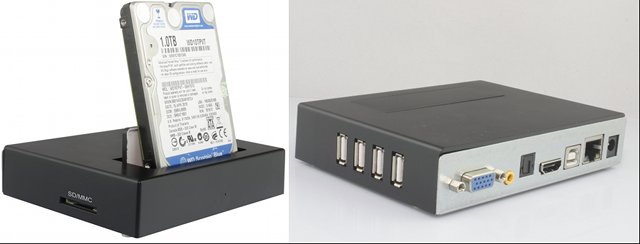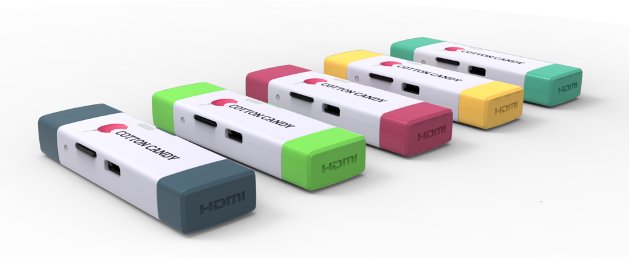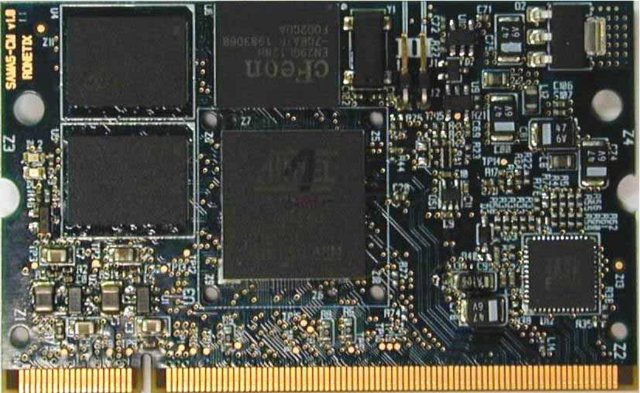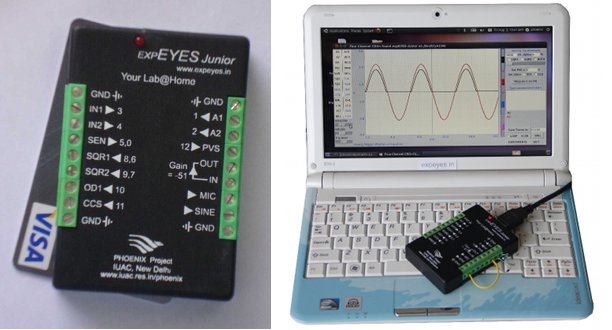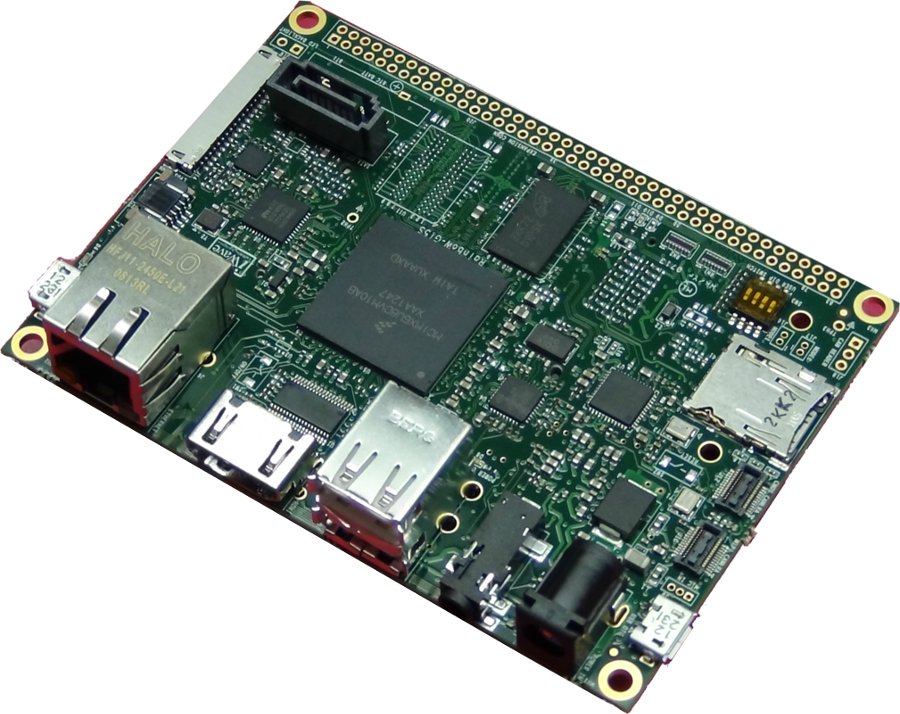AllWinner A20 is a dual core Cortex A7 processor destined to provide an easy pin-to-pin compatible upgrade for AllWinner A10 devices, and the first devices start to appear on the market with several Cloudsto offerings running the latest Android 4.2 Jelly Bean: A20 Media Stick – AllWinner A20 mini PC with 1GB RAM, 4GB Flash, HDMI output, 2x USB Ports and IR receiver. Price: 59.99 GBP ($90.88 US) A20 Media PC – AllWinner A20 set-top box with 1GB RAM, 4GB NAND Flash, onboard Ethernet, HDMI + RCA Video output, Optical output, and 2 x USB Ports. Price: 84.99 GBP ($128.77 US) Cloudsto Media PC PRO DRIVEDOCK – AllWinner A20 set-top box with 1GB RAM, 4 GB Flash, a 2.5″ SATA Hard Drive Bay, HDMI, VGA, and RCA video output and more. Price: 94.99 GBP ($143.92 US) The Media PC PRO DRIVESTOCK is the star of the show, and just looks […]
FXI Technologies Cotton Candy HDMI Stick To Fully Support Both Android and Ubuntu
FXI Technologies was the first company to ever show an HDMI TV dongle when they unveiled the Cotton Candy in November 2011. Since then, many Chinese companies started to provide similar products at lower cost, and the company further improved the Cotton Candy, which is still powered by Exynos 4210 (dual core Cortex A9), by making it even smaller, and getting rid of the internal flash in the process. As a memory refresher, here are the specifications of the Cotton Candy: SoC – Samsung Exynos 4210 dual core Cortex A9 + Mali-400MP4 System Memory – 1GB DRAM Storage – No flash, up to 64GB microSD Video Output – HDMI Connectibity Wifi 802.11b/g/n Bluetooth 2.1 + EDR USB – USB 2.0 male connector for power and connection to devices that supports USB mass storage + microUSB Video Codecs- 480p/720p/1080p Decode of MPEG4-SP/H.263/H.264 AVC/MPEG-2/VC1 Audio Codecs – MP3, AAC, AAC+, Real Audio […]
How to Run Android Apps in Linux with AndroVM
You may want to run some Android applications in your computer. If you’re using Windows, there’s already a decent option with Bluestacks. If you’re using Linux, you could always install the Android SDK and run the emulator, but I don’t really like this option because of the user interface, and for people who don’t need to use the SDK it’s not really the simplest thing to install. The way to run Android apps in Linux is probably to run an x86 Android virtual machine in VirtualBox. Yesterday, I tried the latest development version of Android x86 4.2, but for some reasons I could not control the mouse, and had to perform all tasks with the keyboard. What I’m going to use today instead is AndroVM, an Android VM for x86 processor, that is even more easy to use than the Android x86 image. The instructions has been performed in a […]
Zopfli Library Improves Zlib Compression by 3 to 8%
Google developers have released a new compression library called Zopfli. This library, written in C, is compatible with zlib, yet provide a better compression, more exactly 3 to 8% according to Google. This library can be used on servers for better compression in order to save bandwidth, as well as delivering web pages faster. Since it’s fully compatible with zlib, the web browsers do not need to be changed. The only drawback is that it’s several magnitude slower than zlib, so it’s better used for static content that is compressed once, and sent over the Internet many times, and it may not be a good choice for dynamic content. The source code is available at https://code.google.com/p/zopfli/, so let’s try it. Get the code and build zopfli:
|
1 2 3 |
git clone https://code.google.com/p/zopfli/ cd zopfli make |
Different levels of compression are available:
|
1 2 3 4 5 6 7 8 9 10 11 12 13 14 15 16 17 |
./zopfli -h Usage: zopfli [OPTION]... FILE -h gives this help -c write the result on standard output, instead of disk filename + '.gz' -v verbose mode --gzip output to gzip format (default) --deflate output to deflate format instead of gzip --zlib output to zlib format instead of gzip --i5 less compression, but faster --i10 less compression, but faster --i15 default compression, 15 iterations --i25 more compression, but slower --i50 more compression, but slower --i100 more compression, but slower --i250 more compression, but slower --i500 more compression, but slower --i1000 more compression, but slower |
For testing purpose, I’ve just saved this blog as one html file (test.html – 67275 bytes) […]
Linaro 13.02 Release with Linux Kernel 3.8 and Android 4.2.2
Linaro 13.02 is now available, and features Linux Kernel 3.8 and Android 4.2.2. The biggest news this month is probably the first release of a preliminary ARM64 Debian/Ubuntu Raring image. Other noticeable items include work on ARMv7 KVM, more improvements to OpenEmbedded ARMv8 implementation, as well as big.LITTLE MP implementation, and some modifications to the toolchain for Cortex A7 support. Origen images are not available for download this month, and there’s still no ALIP images since they have disappeared since Linaro upgraded to Ubuntu Quantal. Here are the highlights of this release: Android AOSP master build for Galaxy Nexus has been setup All the platforms have been updated to 4.2.2 Support for lava-test-shell has been added to linaro-android-build-tools. Developer Platform CI bring up: ARMv7 KVM – Add Arndale hypervisor patch to u-boot-linaro. CI bring up: Arndale – Add Arndale image reports to LAVA, Enable and verify UEFI support in the […]
Ronetix SAMA5D3x-CM System-on-Modules Powered by Atmel SAMA5D3 eMPUs
Earlier this month, Atmel launched SAMA5D3 Cortex A5 embedded processor family, and Ronetix recently unveiled CPU modules based on the platform. SAMA5D3x-CM are SODIMM SoM based on SAMA5D3 series processor with 512MB DDR2, 256MB NAND Flash, 4MB SPI Flash, and Gigabit Ethernet. The key features of the modules are as follows: MCU – AT91SAMA5D3x series, 536 MHz ARM Cortex-A5 @ 1.2V (SAMA5D31, SAMA5D33, SAMA5D34 or SAMA5D35) System Memory – 512 MB DDR2 SDRAM, 32-bit Storage: 256 MB NAND Flash 16 MB NOR Flash (optional) 4 MiB Atmel SPI Flash One Wire 1024-bits EEPROM and 64-bits ROM Connectivity – 10/100/1000 MBit/s Ethernet Dimensions – 67.6x40mm (SO-DIMM 200 JEDEC MO-274 module) Temperature range – 0° +70°C or -40° to +85° C SAMA5D3-CM boards support Linux 3.6.9 and Android 4.0. Those are actually the modules used in Atmel SAMA5D3 evaluation kits, so Linux and Android support, starter kits, as well as documentation (except […]
$35 expEYES Junior Transforms the Raspberry Pi, Aakash2 Tablet or any Linux Powered Device into an Electronics Lab
I remember in high school in France, our class only had 2 oscilloscopes and few other electronics equipment, needless to say I did not actually get to use an oscilloscope until I went to university. It would have been nice to be able to play around with oscilloscopes, frequency generators, etc… earlier, but due to budget constraints, this was not possible. Dr Ajith Kumar, a scientist working with the Inter University Accelerator Centre of India, has spent several years working on an ultra low cost electronics lab composed of an oscilloscope and a signal generator to provide students attending schools that cannot afford regular equipments. This learning & experimentation tool is called expEYES, and a prototype was demonstrated last year with the Raspberry Pi. At the end of last year, the final version called expEYES Junior (aka expEYES 2.0) was announced, and is now available to schools and hobbyists in […]
iWave Systems Announces RainboW-G15S Pico ITX Board Powered by Freescale i.MX6 Duallite/Solo Processor
iWave Systems has just launched the RainboW-G15S, a Pico ITX single board computer featuring Freescale i.MX 6 Solo and Dual Lite processor at Embedded World 2013, in Nuremberg, Germany. This embedded board targets intelligent industrial control systems, industrial human machine interface, ultra portable devices, home energy management systems, and portable medical devices. RainboW-GS15 Specifications: SoC – Freescale i.MX6 Dual Lite/Solo, (Quad /Dual compatible) System Memory – 512MB DDR3 (Expandable up to 2GB) Storage – On-board Micro SD slot, standard SD/SDIO slot, optional eMMC support, and an optional SATA 7-pin connector (Probably just to make the board pretty since i.MX6 Solo and Duallite do not support SATA…) Connectivity – 10/100/1000Mbps Ethernet USB – 2x USB Host Connector + micro USB OTG connector Misc – Half mini PCIe card connector, CAN Header Audio & Video interfaces: AC97 Audio Codec with Audio Out Jack & Audio In Header HDMI Port LVDS connector with […]


